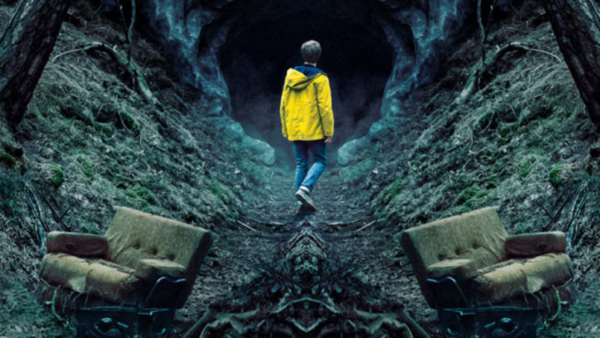
“Scars can see into the future.”- Hannah, Dark ep.1
I’ve recently been writing ekphrastic poems about the Netflix show Dark, a murder mystery with (spoiler alert) time travel. The story follows several families through different time periods. Each character is played by multiple actors. Doubles. Different versions. Split-screen montages at times show the audience how the characters past and present selves are coming in contact with the mysterious phenomena, and, at the same time, knit the story tighter together. Because the timelines are shown out of order, we often see the same relationships both thrive and fall apart. We see scars before wounds even occur.
Don’t listen when I scream
The roads are rain soaked
The power plant is breathing
And the children are missing
Cave howling like a black hole
Won’t tell us if it’s magic
It’s been thirteen days
And no body in the woods
In previous blog posts, Johannes has written about poetry as wound, citing Aase Berg’s scar language in Tsunami for Solaris. She writes: “In difference to the wound, the scar has a temporal dimension. When the wound is open and when the poem by certain poets takes shape, there is no time, just a forever screaming now.”
Dark is in German, so I have to quickly read the English subtitles and write in-between reading. The writing has to happen quickly, if I am to keep up with the plot of the show. Since I am writing so fast, I can’t sit and think things through. I just act. It’s like automatic writing. Certain words, images, phrases, etc. make it through my filter and onto the page. I would like to think that a reader could read these poems before or after watching the show and feel a kind of déjà vu. When I read the poems I can hear, in the background, the soundtrack.
Neither ever nor never goodbye
9 hrs since the disappearance
We fall through the time stream
The power plant surges
Like the whining from a closed box
Like the hollow sound behind a door
And who keeps time in order?
And the rain pours
And no one answers
Rain falls in the flashlight beam
Soaks your hair
Another body is dragged through the forest
Like magic the electric pulse sings
And all the birds fall
In The Necropastoral: Poetry, Media, Occults, Joyelle McSweeney writes, “The future of poetry is the present, it has already arrived. The present tense rejects the future. It generates, but it generates excess without the ordering structures of lineage. It subsumes and consumes pasts into its present, erasing their priority; its rejection of survival in the future may be infanticidal. Without a concern with past or future it necessarily negates many of the values that come from the western literary tradition, including stability, well craftedness, elegance, restraint, timelessness, humanism.”
As the show goes on, the dialogue becomes denser, tries to explain some of the phenomena happening in the town. Black holes, that look like blue-black orbs, and white holes, that look like tears, act similarly. There are different ways to time travel but these black and white holes work when no one expects them to. In the cave, the power plant, the bunker. These are all places where holes regularly appear and quickly seal off.
However, traveling through time itself causes high doses of radiation. And scars. Who knows what this does to your brain? You can meet yourself and not know your own intentions.
Olivia Cronk and Philip Sorenson write in Notes Toward a Z-Axial Literature: “Everything is suspended; everything is longing. It’s the feeling of displacement, a hovering virtuality. It’s anywhere, though especially on tombstones, that writing is visible: outwardly emanating forever. Memory is a crumpled paper with its folds and collisions. It moves faster on foot, making misplacement possible. That’s why smell is the most z-axial sense. Yet, in life the z-axial doesn’t exist and is everywhere. When it passes into the literary, it has to be translated. What is the space between words?”
Fall asleep
Like a wet gash in the wall it appears
And drops the boy’s body
We don’t have much time
Nightmares like a plague
Like a rain that never ends
A fight rolling in puddles
The future influences the past
After today everything will be new
And suddenly it’s snowing
Or is it ash?